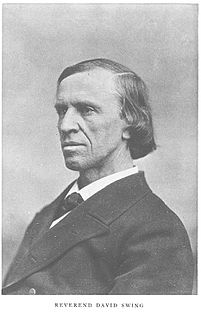A Quote by Swami Vivekananda
We do not seek to thrust the principles of our religion upon anyone. The fundamental principles of our religion forbid that.
Quote Topics
Related Quotes
Our allegiance is to the principles always, and not to the persons. Persons are but the embodiments, the illustrations of the principles. If the principles are there, the persons will come by the thousands and millions. If the principle is safe, persons like Buddha will be born by the hundreds and thousands. But if the principle is lost and forgotten and the whole of national life tries to cling round a so-called historical person, woe unto that religion, danger unto that religion!
Ours is the only religion that does not depend on a person or persons; it is based upon principles. At the same time there is room for millions of persons. There is ample ground for introducing persons, but each one of them must be an illustration of the principles. We must not forget that. These principles of our religion are all safe, and it should be the life-work of everyone of us to keep then safe, and to keep them free from the accumulating dirt and dust of ages.
Sometimes we forge our own principles and sometimes we accept others' principles, or holistic packages of principles, such as religion and legal systems. While it isn't necessarily a bad thing to use others' principles - it's difficult to come up with your own, and often much wisdom has gone into those already created - adopting pre-packaged principles without much thought exposes you to the risk of inconsistency with your true values.
The fact is that we have many superstitions, many bad spots and sores on our body - these have to be excised, cut off, and destroyed - but these do not destroy our religion, our national life, our spirituality. Every principle of religion is safe, and the sooner these black spots are purged away, the better the principles will shine, the more gloriously. Stick to them.
It is often lamented by the churchmen that Washington and Lincoln possessed little religion except that found in the word 'God.' All that can here be affirmed is that what the religion of those two men lacked in theological details it made up in greatness. Their minds were born with a love of great principles... There are few instances in which a mind great enough to reach great principles in politics has been satisfied with a fanatical religion... It must not be asked for Washington and Lincoln that, having reached greatness in political principles, they should have loved littleness in piety.
Every civil government is based upon some religion or philosophy of life. Education in a nation will propagate the religion of that nation. In America, the foundational religion was Christianity. And it was sown in the hearts of Americans through the home and private and public schools for centuries. Our liberty, growth, and prosperity was the result of a Biblical philosophy of life. Our continued freedom and success is dependent on our educating the youth of America in the principles of Christianity.
The moral principles and precepts contained in the Scriptures ought to form the basis of all our civil constitutions and laws . . . The religion which has introduced civil liberty is the religion of Christ and his Apostles . . . This is genuine Christianity and to this we owe our free constitutions of government.
The present Hindu society is organised only for spiritual men, and hopelessly crushes out everybody else. Why? Where shall they go who want to enjoy the world a little with its frivolities? Just as our religion takes in all, so should our society. This is to be worked out by first understanding the true principles of our religion and then applying them to society. This is the slow but sure work to be done.
































